#history of rpgs
Explore tagged Tumblr posts
Text
Remember last time, when I posted about this excellent roleplaying guide, and shared various info about the French history of RPGs? Well I come back with more. Enjoy!

One of the big influences and helpers of the RPG genre in France was a series of books published by Folio Junior/Gallimard from the 1984 onward. This series was usually what introduced many people to the roleplaying game experience as a whole: and it is the line Un livre dont vous êtes le héros, "A book of which you are the hero". Thing is, this line actually gathered and united numerous English-speaking series into one whole. What I mean is that the French "A book of which you are the hero" (sometimes translated as "You are the hero") line wasn't just one translation, but a compilation of Fighting Fantasy (by Livingstone and Jackson), of Steve Jackson's Sorcery!, of Joe Dever's Lone Wolf, of James Herbert Brennan's Grailquest, and more...
Another game that deeply marked the early years of RPG in France was L'Oeil Noir, "The Black Eye". It is not an American game, however: it was a German game, Das Schwarze Auge, created by the Fantasy Productions group, itself founded by Ulrich Kiesow, Werner Fuchs and Hans Joachim Alpers. This game was created after the group had translated two American roleplaying games in German: D&D, of course, but also Tunnels & Trolls. Released in Germany in 1984, this game had a HUGE success in Europe, so much that it overshadowed the sales of D&D in some countries! In France, the game was notably purposefully sold in the same format and aesthetic as the Un livre dont vous êtes le héros - again, French folks wanted to give a cohesive look to all of these games.

The first two French RPGs were both flawed, but in opposite ways. The first one, L'Ultime Epreuve (The Ultimate Trial) was written by Fabrice Cayla and published by Jeux Actuels in 1983. It took place within a medieval fantasy setting (which even at the time felt a bit "recycled" and "already seen") and was about adventurers (the players) fighting various monsters while gaining power and strength, to finally vanquish the creatures that guard the gates of the Valhalla - it is the "ultimate trial" of the title. And then... That's it. The game is over. This game was very simplistic - too simplistic - but one of its originalities relied in its system of experience point. Or rather its absence of XPs: to have characters evolve, the players needed to spend money during "training sessions".
The other "primal RPG", Légendes, was created by a collective of five authors - Stéphane Daudier, Marc Deladerrière, Philippe Mercier, Jean-Marc Montel and Guillaume Rohmer. Published by Descartes in 1983, it is sometimes referred to as "Légendes celtiques" - which is actually incorrect... "Celtic Legends" was only the world-setting offered with the basic set/starting box - but it is just one possibility among many (the line also includes "Légendes des Milles et Unes Nuits" for an Arabian Nights setting ; and "Légendes de la Table Ronde" for an Arthurian setting). However, this game was far too complex: its rules were very heavy and very convoluted, and so the game was not fit for beginners. In fact, Descartes, understanding this, published in 1987 a lighter, simplified version called "Premières Légendes" (First Legends)

In 1985 was published Denis Gerfaud's Rêve de Dragon (Dragon's Dream). Described as an "oniric fantasy" game, this RPG is a strange and fascinating experience where each new adventure plunges the players in an entire new world, created out of the dreams of dragons. Every character was dreamed up by a dragon, and if they die during a game session, their "archetype" will be rencarnated under a new shape once the dragon goes back to sleep. The game ingenuously uses the symbolism of the Zodiac, the Tarot cards and more for its playing system. Gerfaud managed to create a very inventive, very poetic but also quite humoristic game. The first edition of the game was notably illustrated by Bernard Verlhac (aka Tignous), who was unfortunately murdered during the Charlie Hebdo terrorist attack... Dragon Dream was a real "author game" where Gerfaud showed his talents as a writer, but it suffers from quite austere rules, definitively coming from the 80s, and which "chain" the dream rather than encourage the players' imagination... The problem was solved when a simplified version of the game was released in 2001, called Oniros. More recently, the game had a luxury re-edition at the Scriptarium editions, in 2018. As for Denis Gerfaud, he published only one other RPG, just as innovative and strange: Hystoire de fou, in 1998.

Christophe Réaux, alias "Croc", is another French author of RPGs. He first self-published games under the label Futur Proche. He created Bitume, about a post-apocalyptic world a la Mad Max, half-destroyed by the Halley comet ; and then Animonde, a poetic fantasy universe where all weapons and all technologies have an animal origin. Croc was quickly hired by the team of the Siroz Productions to create a game. Siroz Productions was founded by two members of a roleplaying circle of the Viroflay town (Parisian region) known as the "club 20 naturel" (nat 20 club), Nicolas Théry and Eric Bouchaud - a club to which Christophe Réaux belonged. Siroz Productions started out as a minor editor named "Théry-Bouchaud et Cie", but became quite famous due to its games relying on very strong, very contextualized concepts, and satirical humor - tackling issues such as the decay of suburbs, evolutionism, totalitarism, the misuse of ideologies and other futuristic predictios: Zone, Silrin, Whog Shrog, Berlin XVIII...
The game Croc and Siroz created was In Nomine Satanis/Magna Veritas. This game of biting humor is about the players embodying angels and demons infiltrated among humanity, and waging there a secret war for either heaven or hell... Except, as it turns out, both sides use the same methods and the same tactics. Unfortunately, Siroz found itself in a bad situation right before the game's release: drowned in debts, about to close, to survive the publishing house had to agree to the involvment of new investors, and a full restructuration. Siroz Productions became Idéojeux, under the leadership of Marc Nunès. It was under Idéojeux that INS/MV was first published - inaugurating a long line of RPGs written by Croc. Heavy Metal, Bloodlust, Scales, Nightprowler, COPS... Later, Idéojeux renamed itself Asmodée... From the name of the Demon Prince of Gaming within INS/MV, Asmodeus. While the society has gone away from the RPG world, it still forms today one of the big players within the French game industry - in fact, even within the international world of games! Since not only did they buy several French publishing houses (such as Descartes), but they also recently absorbed the American editor Fantasy Flight Games...
While it is quite rare, sometimes French RPGs are brought over to the United-States! It was the case with In Nomine Satanis/Magna Veritas, which in 1997 was published by Steve Jackson Games under the title In Nomine. However it wasn't a translation, but an adaptation: rewritten by Derek Pearcy, the American game is much darker, less serious and less parodic than the French game. The second edition of Rêve de Dragon was translated in English in 2002, under the title Rêve: The Dream Ouroboros.

I'm jumping a lot of things, because this book has so much info... But there is a cover about the "renewal" or "renaissance" of the RPG game from the late 2000s onward. It contains a brief segment about France. Among the numerous new editors that popped up during this "shifting era", when the old generation of gamers left the ground for a new, younger one, one famous is the Black Book Editions, created in 2004 in Lyon, and currently one of the biggest French editors of games. They are behind the French creations of Pavillon Noir, Chroniques oubliées, Polaris, and Héros & Dragons ; but they also are the ones in charge of bringing to France the American monsters that are Pathfinder, Shadowrun, and even (for a brief time) D&D5. The other emblematic editor of this era was Sans-Détour, created in 2008, which became the new French publisher of Call of Cthulhu and helped "renew" it and give it a "younger", "fresher" energy (unfortunately Chaosium removed the license from Sans-Détour in 2018 due to a case of unpaid royalties). A third unmissable name would be Le 7e Cercle, with a diverse and memorable catalogue including games such as Qin, Yggdrasill or Carpharnaüm.

#rpgs#rpg#roleplaying games#french rpg#french rpgs#french roleplaying games#french things#history of rpgs#history of roleplaying games
7 notes
·
View notes
Text
Documentary (Video) Review: The Dreams in Gary's Basement
This week I'm stepping into the TTRPG space (something I normally save for August, but slacked off on this year), to cover a documentary film about the life of Gary Gygax.
This week I’m stepping into the TTRPG space (something I normally save for August, but slacked off on this year), to cover a documentary film about the life of Gary Gygax. Continue reading Documentary (Video) Review: The Dreams in Gary’s Basement
0 notes
Text
One of my perennial probably-never-gonna-do-it ideas for a tabletop RPG is... well, okay, have you ever heard of Chronica Feudalis? It's a tabletop RPG set in 12th Century England, except its central conceit is that it's actually from 12th Century England, in an alternative history in which tabletop roleplaying games were invented during the 12th Century rather than the 20th. The text is written entirely in character as a medieval English monk, with commentary by the contemporary editor who ostensibly translated it from the original Middle English.
Anyway, if I ever find the time to perform the historical research to properly do it justice, some day I want to write a Prohibition era hidden-world science fiction game (i.e., a superficially realistic setting with the science-fictional elements forming a "secret world" within the ostensibly mundane milieu), presented as a game written during the actual 1920s in an alternative history in which tabletop roleplaying games were invented and popularised by H G Wells.
#concepts#gaming#tabletop roleplaying#tabletop rpgs#history#game design#h g wells#alcohol mention#(ish)
3K notes
·
View notes
Text

i don't think i posted this one here... sketch with Yazan and Kat. I reeeeally love to draw extremely content cats.
I want to achieve the same emotion like this cat on a piece from the museum i saw one day. My favorite cat face ever.


#art#lisa rpg#yazan barghouti#lisa the painful#I don't remember what this piece was about...#i think it was something something japan history... i mean you can kinda tell with the artstyle
781 notes
·
View notes
Text
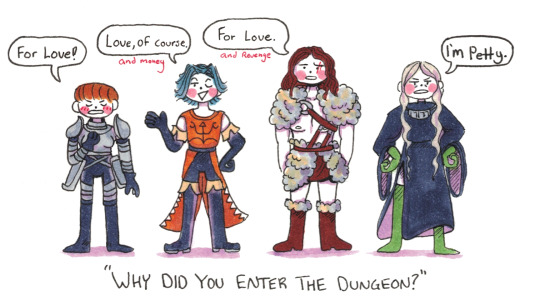
Welcome to the Dungeons of Fear and Hunger.
#Fear and Hunger#D'arce Cataliss#Cahara#Ragnvaldr#Enki Ankarian#Unlike Dungeon Meshi - I cannot in good faith recommend this game to a broad audience.#My background with F&H goes as follows: I am hanging out with a friend. He says “hey try this game I've been playing.” I say “Okay!”#I have never heard of this game. I pick the mercenary. I go through 5 min of character history and background. I am mauled to death by dogs#It took me 4 resets to even get in the dungeon. But I finally get there. I am caught by a guard. He cuts off all but one of my limbs#I am forced to crawl around in a blood and corpse pit until the game tells me 'give up idiot'.#I reset. I am mauled by dogs again. I realize this is not for me but I am intrigued enough to go home and watch some playthroughs#And WOW what an interesting game it is! I really do appreciate games that blend their design philosophy with the theme it wants to set#This is a game about fear and hunger. And persevering. And penis (my god is there a lot of penis)#I recommend this to people who like extremely challenging games and can handle the many *content warnings* within this series#If the idea of Bloodborne/eldenring and undertale having a little RPG maker baby sounds appealing to you - give it a shot#It's made by ONE GUY and it's a great horror game. I am just really bad at it.#My friends just enjoy putting me in situations where I scream and yell. We don't talk about the corn mazes. Or the other horror game nights#Apparently I'm funny when I'm Scared!#As people who follow me on twitter might know; I am deep in the pits of this series right now. I will be back with more art.
1K notes
·
View notes
Note
I’m suddenly getting swathes of Lancer hate across my feed… Has something happened in the fandom? “Union is ______ how could they paint them as even remotely good. They allow _____, and I hate the devs they are ______. The whole thing is just 40k with communist veneer”.
Like am I taking crazy pills…? I thought that all of the problems were literally like right there on the tin “we are a utopia in progress! We will obtain it by any means possible even if it means being everything we say we are not/fighting against. As the player you decide what is right. How much will you ignore for someone else’s idea of utopia?” Like doesn’t it mean all the tools to actually change are there and that is the HOPE aspect of all of this?
(Sorry if this in incoherent grammar is a weak point and I pulled something in my back simply standing up. Now I am sad and crook backed in spasmodic pain)
This isn't an argument I feel super enthusiastic about stepping into, because it gets the most annoying sort of people in your mentions eager to maliciously misrepresent what you say.
However, yeah, there are some pretty terrible readings of Union floating around. I'd invoke "media literacy" because think that a lot of this comes from people not really holistically engaging with the fictional future history of Lancer, but also from a sort of dogmatic purism that requires future societies to be flawless, else they're irredeemable.
It is important to note that ThirdComm is the direct descendant of two highly imperfect societies. FirstComm was formed as a response to the Three Great Traumas of discovering the Massif Vaults (and thus that they were the inheritors of a fallen world), the wars over the Massif Vaults, and the discovery of the lost colonies, all of which collectively showed humanity how close it had come to total extinction.
FirstComm decided that it had a responsibility to ensure that humanity never risked extinction again. It manifested this by trying to colonize every habitable planet it could find, pumping out ship after ship to seed the cosmos with as much human life as it possibly could. This led to problems when it encountered civilizations like the Karrakin Federation and the Aun, who had been carrying humanity's torch just fine by themselves, thank you very much.
SecComm was an Anthrochauvinist fascist state. The book defines it thusly:
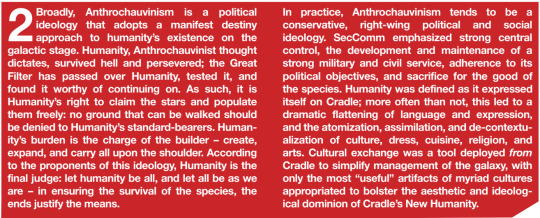
We can see a lot of Anthrochauvinist historical romanticism in the mech naming schemes of Harrison Armory, SSC and IPS-N - the fact that Harrison Armory names its mechs after great military leaders of pre-Fall Earth history, IPS-N does the same with naval figures, and SSC uses the names of Earth animals. Even the GMS Everest is named for a mountain on Earth. It's very Cradle-centric.
Anthrochauvinism was, to be clear, largely just an excuse for colonialism and hegemony. Atrocities could easily be justified under by stating that whoever they're being committed against were a threat to the Continuance of Humanity - a term that SecComm got to define.
It's also at this point that we have to zoom in from broad sociopolitical points to address one very specific piece of history: the New Prosperity Agreement. This was signed to prevent the outbreak of a Second Union-Karrakin War, and mandated that the Karrakin Houses would maintain privileged levels of autonomy within Union, and that they would be granted colonial rights to the entire Dawnline Shore. This agreement, struck in 3007u, basically defines much of the current political situation today.
ThirdComm was a final and inevitable reaction to the atrocities, abuses and excesses of SecComm. The unspeakable horrors of Hercynia were the spark, but I need to stress how little Hercynia actually mattered in the larger Revolution - at the start of NRfaW, it's explicitly stated that almost nobody in the galaxy even knows where it is, let alone what happened there. The Revolution was a generalized response to SecComm's tyranny, with no single rallying cry.
The Revolution might also have failed entirely, but for a critical error by Harrison Armory: pissing off the Karrakin Trade Baronies. After getting kicked off Cradle, the Anthrochauvinist Party organised a fleet at Ras Shamra to try and retake Cradle. Simultaneously, however, they were attempting to secure protectorate agreements to steal worlds in the Dawnline Shore out from under the KTB. Putting these two together and making five, the KTB assumed that the fleet was pointed at Karrakis, and started the First Interest War.
The First Interest War initially favoured the KTB. They smashed the fleet above Ras Shamra and simultaneously conquered the moon of Creighton in the Dawnline Shore. However, they underestimated just how ruthless Harrison I was - he "retook" Creighton by relativistic bombardment, and then conquered four of the 12 worlds of the Dawnline Shore with mechanised chassis, a technology the KTB had not adopted and had no counter for.
To prevent further loss of life, Union was eventually forced to broker a peace agreement that saw Harrison I handing himself over to Union justice in return for Harrison Armory's continued sovereignty, and the KTB joining Union as a full member state.
So, with that historical context out of the way, let me get to the second part of this absurd essay I'm writing.
Third Committee Union isn't a civilization that arose from whole cloth. It's shaped by five thousand years of Union history, six thousand years of post-Fall history, and six thousand years of pre-Fall history before that. It is, ultimately, an extremely well-thought-out and well-worldbuilt fictional polity, in that all of its imperfections come from traceable root causes in its history.
Why does ThirdComm permit the abuses of the KTB? Because to stop them, it would likely have to go to war, and such a war would butcher billions. Worse, to do so, it would probably have to ally with Harrison Armory and make horrific concessions.
Why does ThirdComm permit the expansionism and cryptochauvinism of the Armory? Because to stop them, it would likely have to go to war, and such a war would butcher billions. Worse, to do so, it would probably have to ally with the KTB and make horrific concessions.
Nobody in CentComm likes that Harrison Armory are empire-building expansionists. Nobody in CentComm likes that the KTB has a hereditary nobility and enforces blockades against planets that rebel against it. The problem is that ThirdComm is, in historical terms, still relatively new. They've been around five hundred years, and compared to the 1600 years that SecComm was around and the 2800 years FirstComm existed for, that's not very much.
ThirdComm is attempting to decouple itself from the Cradle-first politics of its predecessor, and to amend the many, many atrocities committed in the name of Humanity. It is not easy to do any of these things. SecComm was defined almost entirely by the fact that if it didn't like what you were doing, it would send in the military as a first response. Every time ThirdComm chooses to do the same, its legitimacy erodes, because the mission of ThirdComm is to prove that diverse, vibrant and compassionate human civilization can exist without devolving into war and bloodshed. ThirdComm always tries diplomacy as a first response because if it doesn't, millions of people could die.
746 notes
·
View notes
Text

Knights of the Realm, Old Country Baron of Oaren
#art#illustration#design#digital art#drawing#character design#rpg#ttrpg#knight#armor#sword#baron#medieval core#medieval fantasy#low fantasy#history
153 notes
·
View notes
Text
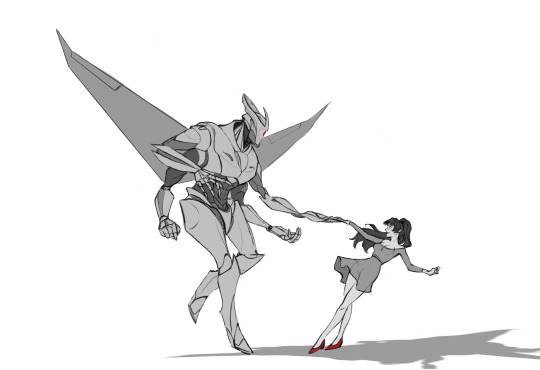
Let's Dance<< put on your red shoes and dance the blues let's dance to the song they're playing on the radio
-----
Having a lot of feelings about them. Last session did things to me.
#lancer rpg#lancer ttrpg#lancerrpg#ssc dusk wing#smith shimano#original characters#robots#Feren Wainridge#Having a lot of feelings about them#There's so much of their history and dynamic that's just stuck living in my head and now i scream into a pillow#needed to get this out of my system quick between schoolwork though#trying to be better about just posting sketches even if they're messy#ssc#smith-shimano#nhp#technophile nhp#bee draws things
211 notes
·
View notes
Text
Orava Castle, a medieval (13th century) stronghold on an extremely high and steep cliff by the Orava River, Slovakia.

1K notes
·
View notes
Text
The politics in Lancer the mech pilot TTRPG seems center left to me. A good way to explain what's going on in that game's universe is with this overly long metaphor:
Imagine an alternate history where Nixon somehow beat JFK Jr to the white house, and once in office he lets Kissinger go nuts setting fascists up on an accelerated schedule. That's what Union's Second Committee was like. Then Tricky Dick procedes to nuke Vietnam a couple times. That's the Hercynia Crisis and that FTL Piston weapon launch. JFK and company ride the shock and horror of approaching nuclear war into office on the promise of de-escalation and enforcing civil rights, and they deliver. That's the coup that formed Union's Third Committee. Kissinger, Nixon, and the entire pentagon/raytheon corp take over NASA in Cape Canaveral, Florida where they form a tolerated corporatocracy in exile. That's basically Harrison Armory on the planet Ras Shamra. Now a United liberal-leftist front of America is actively trying to tear down dictatorships around the world that Kissinger set up (he got assassinated at some point in this time line) and replace them with socialist democracies. That is Union's Justice/Human-Rights Department and a few other government branches. So far they've had some success although people are pointing out that it's a bit hypocritical that the liberators are using weapons from corporate conservative states where civil rights are discretely curtailed. That's what's driving political discourse in 5016u in Union's legislative body, the Central Committee and it's myriad political parties.
So yeah Lancer's political intergalactic landscape is a bit like modern day? Except also cthulhu is giving out reality-breaking tech to militant civil rights advocates and random civilians? That's what HORUS basically is, btw.
Now that I've written this out, it would make for a good american alt-history with mechs campaign in Lancer...
#henry kissinger#lancer rpg#alternate history#union's third committee#union's second committee#harrison armory#science fiction#table top role playing#ttrpg#mech#mecha#usa politics#usa history#richard nixon#john f kennedy#us history#us politics#horus
420 notes
·
View notes
Text
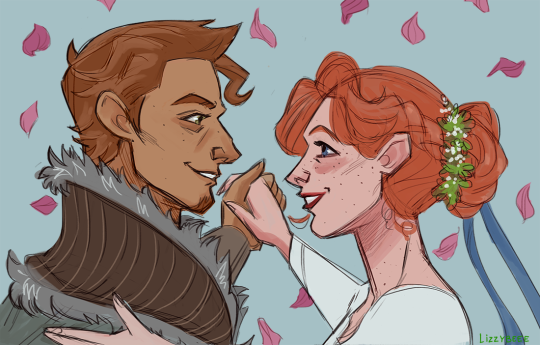
"And then it was over."
#you can pry their happy ending from my cold dead hands bioware#he's going to pick her up and give her a spin like at the end of Anastasia - that is the best romantic spin hands down#this was the game that made me fall in love with rpg's -> it blew my little teen mind#having Duncan narrate the ending - especially Alistair's coronation 'joyfully greeting their king' was a gut punch 10/10#has anyone ever considered how crazy their wedding would be???#according to the epilogue the wedding is 6 months later but Awakening is 6 months later...so they get hitched and she leaves immediately#or my headcanon is that they get married when she gets back which means you can have the awakening crew at the wedding#and i want the chaos of that wedding lmao#found my old brush that i used for everything 5 yrs ago and it looks like history is repeating itself - one brush for everything 2.0#fuck i uploaded the wrong version lmao fml#dragon age origins#my art <3#alistair x cousland#cerys cousland (oc)#alistair theirin#dragon age fanart#da fanart
57 notes
·
View notes
Text
Documentary Review: The Dreams in Gary's Basement
A couple years ago I reviewed Secrets of Blackmoor – a documentary about Dave Arneson, and the development of the Blackmoor campaign leading up to the development of the first edition of Dungeons & Dragons. Kickstarting around the same time was Dreams in Gary’s Basement, a documentary focusing on the life of Gary Gygax. I’ve covered a couple of biographies of Gygax’s life in the past – Empire of…
0 notes
Text
Okay, so we all know the real reason for the vampires-versus-werewolves thing in popular culture is because back in the 1930s, the same studio owned the movie rights to Dracula, Frankenstein and the Wolfman, and they decided to moosh them all together into what is arguably the first Big Stupid Cinematic Universe, but what's slightly less well known is that H G Wells' The Invisible Man was also part of that package. I want to see what the goofy we-swear-it's-personal-horror tabletop RPG based on that facet of the mythos looks like, weirdly artificial taxonomies of playable splats and all – everybody's invisible, but there are like five completely different possible reasons for that, plus a sixth, evil reason for being invisible which you're not allowed to play as because they secretly rule the world.
#gaming#tabletop roleplaying#tabletop rpgs#universal horror#universal monsters#vampires#werewolves#invisible men#media#movies#literature#tropes#history#media history#the invisible man#h g wells
4K notes
·
View notes
Note
Who is Yvette and may I please know more about their streaming career? 🙏
Comtesse Yvette Preux is, for lack of a better word, one of the ‘iconic’ investigators/PCs in Eureka: Investigative Urban Fantasy. She appears in a lot of art in the rulebook, as do many of the PCs of the A.N.I.M. team and our friends.
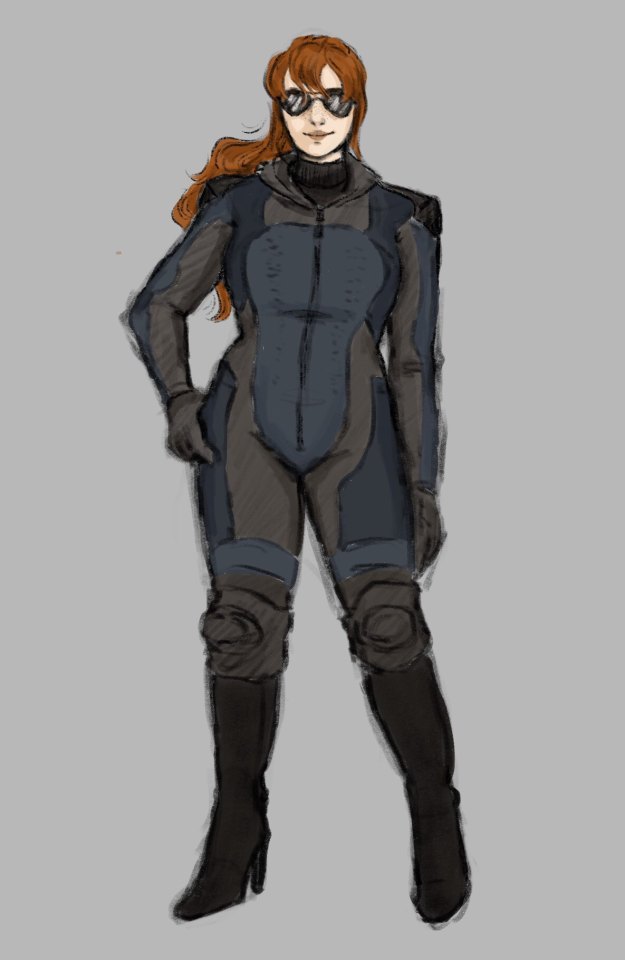

(both by team artist @chaospyromancy)
She’s also the first ever monster PC to ever be played in Eureka, back before Eureka even had official monster PC rules. The incredible success of that campaign is what set the precedent for what monster PC gameplay would come to be in Eureka.
You can read a bit of an origin story for her in this post
In the 2010s and 2020s, she has a fairly successful twitch streaming/influencer career, with her gimmick being that she claims to be a real 800+-year-old vampire, and allegedly never breaks character. Her twitch and YouTube channels cover competitive gaming, challenge runs, advanced math, firearms, and urban exploring.
In-person she is.. a little harder to get along with. She’s.. old-fashioned, and her values are very distinctly those of someone who grew up rich and Catholic in the 1200s, which ironically means she has little in common with a modern “tradcath.”
The contrast between the modern world, the modern world’s pop culture idea of the Middle Ages, and the actual Middle Ages is a major theme in the parts of her story where she’s actually integrating into the society of the 1990s and 21st century.
Many would expect her to be virulently and openly hateful, but that’s the pop culture Middle Ages. The actual Middle Ages were oppressive in different and more interesting ways.
I’ll give a few interesting examples
In the Middle Ages, women were considered the more “lustful” and “sexually aggressive” sex, a bit like men are thought of today. It’s women who were considered basically responsible for lust in the first place, to the point that it was considered a public health issue. Lust with no outlet was thought to be detrimental to one’s overall physical health. Sex or even masturbation was sometimes prescribed by doctors to combat this.
This is a comedic exaggeration/oversimplification but in the medieval world being around women would gradually fill up a Dark Souls-style Lust meter and if you didn’t do anything to reduce it it would take a chunk out of your health, making you sickly and prone to other health problems. Women were more resistant to this because they’re the source of lust in the first place. Medieval women covered their legs and their hair in particular for everyone’s protection.
This manifests in Yvette as her not caring at all about being naked in front of female friends, but being careful not to look too sexy around male friends. And then awkwardly telling them to masturbate later if they need to because it’s better to sin and live than to avoid sin to the detriment of one’s health. (In fact, knowingly damaging one’s health is a sin.)
In the art, you can see her not only wearing pants, but even wearing pants that show her ankles and legs, and wearing her hair down. It took her a long time to get comfortable wearing anything but full-length skirts around men, but these risqué (to her) outfits are symbolizing her character growth from someone who is accommodating to others to a fault, to prioritizing her own comfort, even at cost to others.
In the Middle Ages, they did not conceptualize homosexuality like we do now. No one was gay, and neither was anyone straight. Attraction wasn’t a trait of an individual, it was a fact. Homosexuality wasn’t really considered a thing that you were, it was a thing you do. It’s really hard to explain so I’m just going to hope y’all get it along with the example. Sodomy was sodomy, and that was considered to cover basically any irregular form of sex. Irregular sex between a man and woman was as much sodomy as sex between a man and another man. This also means that there was no presumption of homosexuality in the Middle Ages. You didn’t have to say “no homo” before you touched your same sex friend’s hand. Close friends would kiss each other on the mouth and stuff, and that was considered normal. (Though something you would want to avoid was spending more than a few minutes alone with an opposite-sex friend, because that could be used to call the woman’s virginity into question, which could hurt her eligibility for marriage.)
As Yvette understands it, in the 21st century, people have constructed entire communities around their enjoyment of sodomy, like how she’s a member of the gun club. She has complex feelings about that but it isn’t like she’s never engaged in sodomy before either. (She brought this to confession and did her penance so it’s fine.)
What really aggravates her is how she can’t touch or kiss any of her friends in the 21st century without it being considered sexual.
She argues it’s not “gay” for her to feel attracted to women either, it’s normal. Women are naturally attractive to everyone.
Where it really gets abrasive though is probably the classism. She’s from the noble class and still considers that to really matter, it makes her a little bit better than everyone else, and more qualified to be making decisions for people.
She does love commoners, though. All her friends are commoners, and she’s very protective of them. She’s too autistic to get that noblesse obligé wasn’t supposed to be a real principal she lives by and even back when she was for-real managing a fiefdom she was an advocate for the comfort of the peasantry.
I'm gonna have to stop listing all her quirks here because if I don’t stop then it’ll go on forever. If you want to read some short stories that feature her, subscribe to our Patreon.
I’ll segway by saying that two more major aspects of her are generosity and power. She revels in power in all forms, including the power to solve the problems of people who are helpless to solve them themselves. Like I said, she takes noblesse obligé very seriously. Jesus Christ had the power to multiply the fish and bread for the hungry, so he did. She can help, so she will(whether you like it or not). She hardly even considers it a “duty,” it’s more like why would she ever do anything else? Sometimes this means giving away staggering amounts of money, other (more exciting) times it means getting involved in a Eureka adventure/investigation, the more challenging and dangerous the better, because it makes her even cooler. This is what gets her into Eureka adventures. She’s going to help the helpless, what does it matter if it also fuels her ego?
I also just realized I’ve said very little about her actual twitch streaming career. Like I said, her gimmick is that she’s a real vampire. In the 2010s and 2020s, she is more or less “out” as a vampire, openly identifying herself as such and doing almost nothing to hide any aspect of her vampirism(except the part where she sneaks up on people in the night and drinks their blood, but she doesn’t hide that because it’s a vampire thing, she hides that because it’s an assault charge). Most people just think she’s weird, or really really dedicated to the persona. And if somebody does actually see her not reflecting in a mirror, or some other unexplainable proof of vampirism, what are they going to do? Go online and say “hey everyone I think that this popular e-celebrity whose gimmick is that she says she’s a vampire actually is a real vampire!��? Vampires aren’t real, idiot.
If you want to read short stories about her, you can get them with a $5 subscription to our Patreon,
and she and her exploits in Eureka campaigns are also talked about a lot in the A.N.I.M. TTRPG Book Club.
The Eureka: Investigative Urban Fantasy rulebook will also have a section that will probably be called “the making of a vampire” that will detail some of her actual living life and shine a little more light on how a vampire actually comes to be in Eureka’s world.

#eureka#eureka: investigative urban fantasy#eureka ttrpg#ttrpg tumblr#ttrpg community#indie ttrpg#rpg#ttrpg#vampire#indie ttrpgs#vtm#vampire the masquerade#vampirism#vampire the requiem#vampiress#vampires#urban fantasy#supernatural#medieval#medieval history#middle ages
77 notes
·
View notes
Text
Added Virgil and snow!
The message box is still a work in progress, but I'll leave it as is for now (the portraits are also place holders). I'm pretty content having come this far even if it doesn't seem like a lot...I will keep practicing RPG maker!
#classics#tagamemnon#dante alighieri#dante's inferno#divine comedy#virgil#roman history#ancient rome#RPG maker#game dev
70 notes
·
View notes
Text
Happy 20th anniversary of VtM:B!!!

To celebrate me and my fandom colleagues created a series of arts in swapcard format
VV is the best (It's a proof not a statement) so you knew I would draw her.
#VTMB#Velvet Velour#20 year anniversary#happy 20th anniversary everyone!#vtm bloodlines#vampire the masquerade#video games#gaming#RPG#game history#VtM#VV#WoD#vtm art#vtmb#illustrators on tumblr#my art#art#digital art#artists on tumblr#Featured
59 notes
·
View notes